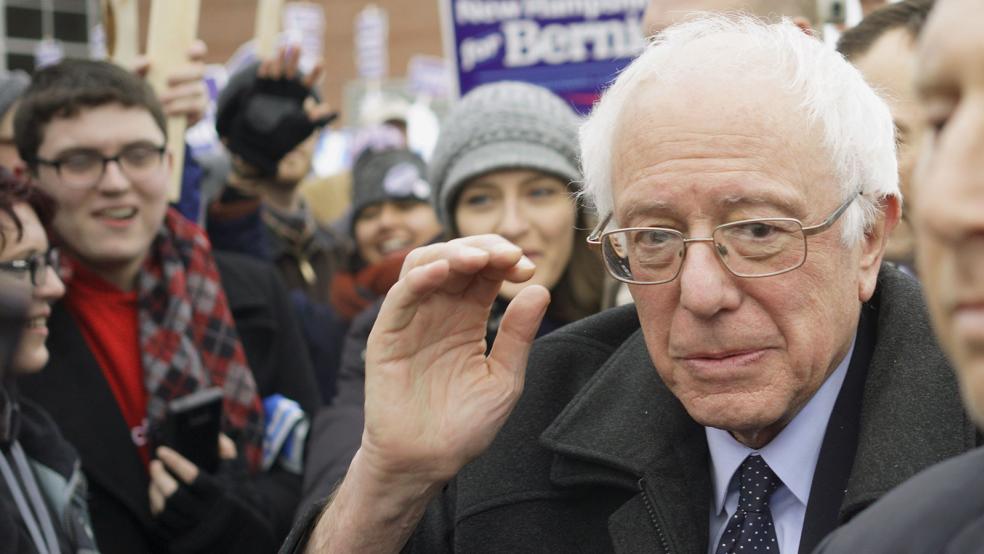Did Sen. Bernie Sanders have a Ben Carson moment during Thursday night’s debate with Hillary Clinton in New Hampshire?
On most topics — from income inequality and the sins of Wall Street to healthcare reform and education — the 74-year-old democratic socialist is passionate and well-versed in making his case for a revolutionary approach to government.
Related: Sanders Closes the Gap on Clinton – and Cleans Up Against the GOP
But for a long time it has been obvious that the soft spot in his armor has been foreign policy and national security. He stumbled again on those topics during Thursday night’s two-hour debate. Or as James Hohmann of The Washington Post observed, Sanders “sounded out of his depth on foreign policy during his first mano-a-mano debate with Hillary Clinton.”
Max Fisher at Vox — in what was ultimately a defense of Sanders — described just how poorly the candidate fared on foreign policy questions: “now that he's a much more serious candidate, you'd like to think he would have given even just a few minutes' thought to his potential future leading the foreign policy of the most powerful country in human history. There's real reason to fear, from this debate, that he has thus far not taken even those few minutes.”
For instance, Sanders twice dodged the question of how long he would leave at least 10,000 troops in Afghanistan, shifting the conversation by saying, “our great task is to make certain that our young men and women in the military do not get sucked into never-ending, perpetual warfare within the quagmire of Syria and Iraq.”
On ISIS, Sanders insisted that “the combat on the ground must be done by Muslim troops with our support. We must not get involved in perpetual warfare in the Middle East.”
But he had no real rejoinder for Clinton when she cited foreign policy and military analysts’ criticism of his views, such as inviting Iranian troops into Syria to try to resolve the conflict there while at the same time enlisting the aid of Saudi Arabia. “Asking Saudi Arabia and Iran to work together [is reckless], when they can’t stand each other and are engaged in a proxy battle right at this moment,” Clinton said.
Related: Clinton Attacks Sanders’ $14 Trillion Health Plan as ‘Wishful Thinking’
When MSNBC debate moderator Chuck Todd noted that Sanders has yet to deliver a major foreign policy speech, Sanders corrected him, saying that he gave a speech at Georgetown University in November on democratic socialism and foreign policy.
“Maybe I shouldn’t have combined the two in the same speech, because the foreign policy part of it didn’t get much attention,” Sanders said.
The Vermont senator then back-pedaled on his previous call for an aggressive effort to normalize relations with Iran — a position strongly opposed by Clinton and President Obama despite the recent agreement to limit Iran’s nuclear program.
Related: Clinton Insists She’s Not Beholden to Wall Street While Raking in $21.4 Million
“If we were to normalize relations right now, we would remove one of the biggest pieces of leverage we have to try to influence and change Iranian behavior,” Clinton explained.
“Who said that I think we should normalize relations with Iran tomorrow?” Sanders fired back. “I never said that. I think we should move forward as quickly as we can.”
Finally, pressed by Todd to rank North Korea, Iran and Russia in terms of which posed the greatest threat to the U.S., Sanders replied: “ISIS would be.”
“I didn’t say that,” Todd said. “We already had that. I’m talking about these three countries.”
Sanders settled on North Korea, which he described as a “very strange situation because it is such an isolated country run by a handful of dictators, or maybe just one, who seems to be somewhat paranoid. And who had nuclear weapons.”
Similar miscues on foreign policy are what doomed Carson, who at one time rank neck and neck with Donald Trump in the GOP presidential race, and knocked him out of serious contention for the Oval Office.
Sanders has adopted tough rhetoric in vowing to galvanize international allies — particularly Saudi Arabia and other allies in the Middle East — to “crush” ISIS. And he frequently cites his House vote in 2002 against a U.S. invasion of Iraq as evidence of his sound judgment on foreign policy, in contrast to Clinton’s support of the effort to topple Saddam Hussein.
Clinton has admitted she was misled by the administration of President George W. Bush in supporting the invasion, but has argued that being right on one vote doesn’t qualify you to become the next commander in chief, or assure you have the experience and know-how to deal with international crises.
“I know from my own experience that you've got to be ready on day one,” she said. “There is just too much unpredictable threat and danger in the world today, you know, to try to just say ‘Wait, I'll get to that when I can.’ That is just not an acceptable approach.”
She used a similar argument in 2008 in her unsuccessful campaign against Barack Obama, insisting that her years on the Senate Armed Services Committee and as First Lady made her better suited to answer a 3 a.m. phone call about an unforeseen crisis.
The argument failed to catapult Clinton past Obama. Whether it wins out this time remains to be seen. Polls taken around Monday’s Iowa caucuses showed voters trusted Sanders by a wide margin over Clinton. And she has the accumulated baggage of her time helming the State Department, including the deadly attacks in Benghazi, Libya, the failed “reset” with Russia and the administration’s grab-bag of approaches on how to deal with the conflict in Syria.






